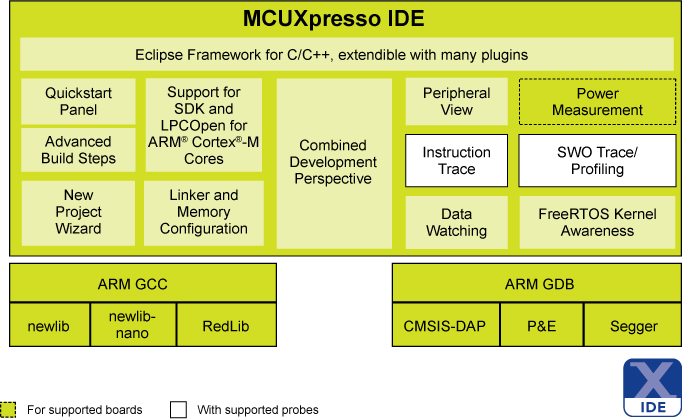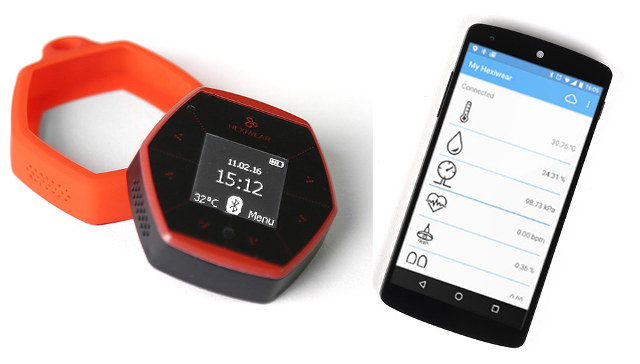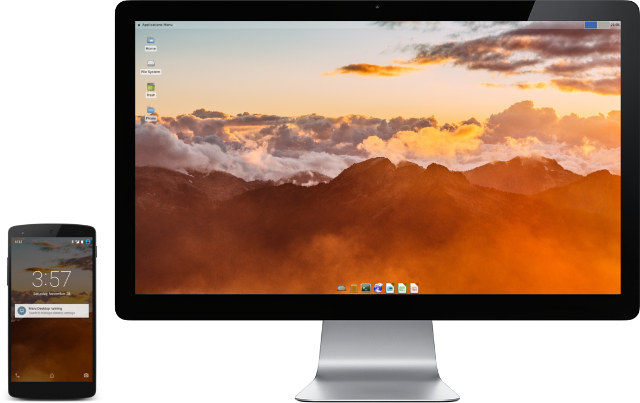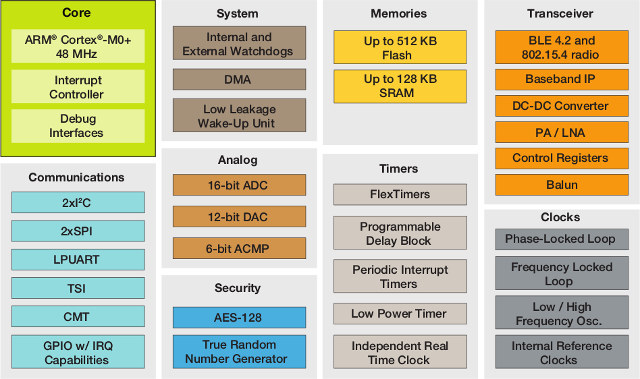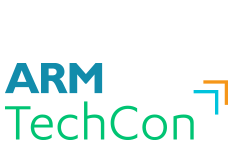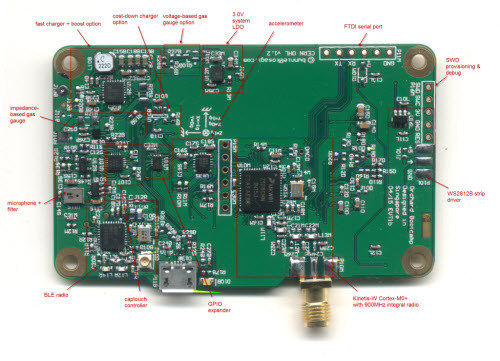After NXP bought Freescale, you had development tools for Freescale Kinetis MCUs such as Design Studio or Kenetis SDK, and others such as LPCXpresso for NXP LPC microcontrollers. The company has worked to unifying software and tools support between its ARM Cortex-M MCU families, and has now announced MCUXPresso software and tools for both NXP Kinetis and LPC MCUs. MCUXpresso unifies thousands of Kinetis and LPC microcontrollers under a set of compatible tools including MCUXpresso SDK – Open-source software MISRA-compliant development kit (SDK) with peripherals drivers, wireless & wired connectivity stacks, middleware, real-time OS, getting started guides, API documentation, and application examples. MCUXpresso IDE – Integrated development environment (IDE) for editing, compiling and debugging. It also integrates MCU-specific debugging views, code trace and profiling, multicore debugging, etc… Both free and professional edition of the IDE will be available, and LPCXpressor and previously Freescale Freedom & Tower platforms will be supported. […]
Teensy 3.5 & 3.6 Boards Feature NXP Kinetis K64 & K66 MCUs (Crowdfunding)
Paul Stoffregen has been making Teensy USB MCU development boards since 2008, and has just launched the latest Teensy 3.5 & 3.6 boards powered by NXP (previously Freescale) Kinetis K64 & K66 ARM Cortex-M4 MCUs with a micro USB port for power and programming, a micro SD slot, and several I/Os. Boards specifications: MCU Teensy 3.5 (T3.5) – NXP Kinetis K64 ARM Cortex M4 MCU @ 120 MHz with FPU, 512KB flash, 192 KB RAM, 4K EEPROM Teensy 3.6 (T3.6) – NXP Kinetis K66 ARM Cortex M4 MCU @ 180 MHz with FPU, 1MB flash, 256KB RAM, 4K EEPROM Storage – micro SD card port USB – 1x USB Full Speed (12 Mbit/sec) Port; T3.6 only: 480 Mbit/sec host port Connectivity – 10/100M Ethernet mac 62x I/O Pins (42 breadboard friendly) 25x Analog Inputs to 2 ADCs with 13 bits resolution 2x Analog Outputs (DACs) with 12 bit resolution 20x […]
Hexiwear is an Open Source Wearable Development Kit Expandable with Add-on Boards (Crowdfunding)
MikroElektronika has designed Hexiwear, a wearable development kit that you can wear and hack as a smartwatch thanks to an (optionally) included wristband, or use a an IoT development kit thanks to its docking station taking up to three “Click” boards among a choice of over 180 modules. . Hexiwear hardware specifications: MCU – NXP Kinetis K64x ARM Cortex-M4 MCU @ 120 MHz with 1MB Flash and 256KB SRAM Storage – 8 MB Flash memory Display – 1.1” full color OLED display with capacitive touch Connectivity – Bluetooth 4.0 LE and 802.15.4 via NXP Kinetis KW4x Cortex-M0+ wireless MCU Sensors -3D accelerometer and magnetometer (NXP FXOS8700CQ), 3-Axis gyroscope (NXP FXAS21002), pressure sensor (NXP MPL3115A2R1), light-to-digital converter, humidity and temperature sensor, heart-rate sensor (HRM) USB – micro USB cable for power and charging Misc – RGB LED, haptic feedback engine, docking connector Battery – 190 mAh 2C Li-Po battery; 600 mA […]
Open Source Operating Systems News – Maru OS, Zephyr, ReactOS, Tizen 3.0, and Raspbian
There have been several news related to open source operating systems in the last couple of weeks including Maru OS to run Debian on Android, Zephyr Project real-time OS managed by the Linux Foundation, ReactOS an open source port of Windows XP, and Raspberry Pi boards are getting a Tizen 3.0 port, as well as a new Raspbian release. Maru OS – Mobile <-> Desktop Convergence Maru OS mobile operating system is supposed to do what Ubuntu convergence promised: it runs in mobile mode on the go with Android Lollipop mobile OS, once you connect the phone to an HDMI screen, and pair Bluetooth keyboard and/or mouse, it will switch to desktop mode running Debian Linux. The downside is that so far it a single developer (Preetam D’Souza) worked on it, and the beta version only works on Nexus 5 smartphone. However, since the project went viral, dozen of other […]
Wind River Introduces Free Cloud-based Operating Systems for IoT Applications
After Google Brillo operating system was officially launched last week, another company has announced free operating systems for IoT. What’s peculiar is that the company is Wind River a vendor of commercial operating systems whose typical business model is to sell licenses for their operating systems and fees for their development services. Nevertheless, the company has now introduced Wind River Rocket real-time operating system, and Wind River Pulsar Linux operating system. Both OSes will interface with the company’s Helix Cloud software-as-a-service (SaaS) products, which is probably how the company intends to monetize their work, on top of customization services. Wind River Helix App Cloud is currently made of three products: Helix App Cloud cloud-based development environment for building IoT applications Helix Lab Cloud cloud-based virtual hardware lab for simulating and testing IoT devices and complex systems. Helix Device Cloud cloud-based platform for managing deployed IoT devices and their data. Some […]
Freescale Kinetis KW41Z Wireless MCU Supports Bluetooth 4.2, Zigbee, and Thread
Freescale has unveiled a new wireless micro-controller part of their Kinetis MCU family with Kinetis KW41Z, based on an ARM Cortex M0+ core, and supporting both the latest Bluetooth 4.2 specifications, as well as a 802.15.4 radio allowing support for Zigbee and Thread. Kinetis KW41Z main features and specifications: ARM Cortex-M0+ core @ 48 MHz, with up to 512 KB Flash memory, up to 128 KB SRAM, and an integrated balun Multi Protocol Radio 2.4 GHz radio, Bluetooth Low Energy 4.2 compliant IEEE 802.15.4-2011 standard compliant radio Receiver Sensitivity (Typ.) – BLE: -96 dBm; 802.15.4: -102 dBm Programmable Transmitter Output Power up to +4 dBm I/Os – 2x I2C, 2x SPI, LPUART, TSI, CMT and GPIOs with interrupt capabilities Analog modules – 16-bit ADC, 12-bit DAC, 6-bit High Speed Analog Comparator (CMP) Security – AES-128 Accelerator (AESA), True Random Number Generator (TRNG) Operating Voltage Ranges Bypass Voltage: 1.71V to 3.6V […]
ARM TechCon 2015 Schedule – IoT, Servers, 64-bit ARM, Power Usage Optimization, and More
The ARM Technology Conference (ARM TechCon) will take place on November 10 – 12, 2015, in Santa Clara Convention Center, and just like every year, there will be a free exposition for companies to showcase their latest innovation and/or products, as well as a technical conference with sessions and workshops sorted into various tracks: Automotive/Embedded Vision Embedded IoT Mobile/Connectivity Networking Infrastructure/Servers Tools & Implementation Wearables/Sensors ARM Training Day Sponsored Vendor Training Special Event General Event Software Developers Workshop You can find the complete schedule on ARM TechCon website. Although I won’t attend, I’ve created my own virtual schedule with some of the sessions I found interesting. Tuesday – November 10 8:30 – 9:20 – ARM Vision for Thermal Management and Energy Aware Scheduling on Linux by Ian Rickards (ARM), Charles Garcia-Tobin (ARM), Bobby Batacharia (ARM) This talk will cover the history and where are we going, for ARM’s Power Software (IPA, […]
Orchard is an Open Source Hardware Multi-Radio IoT Board Used to Learn Coding, Hardware Design and Manufacturing
Sutajio Ko-Usagi’s wiki is the place where you find documentation for open source hardware projects such as Novena laptop or Fernvale IoT board. There’s another IoT board supporting 900 MHz and Bluetooth radios called Orchard. Orchard board specifications: MCU – Kinetis MKW01 ARM Cortex-M0+ MCU @ 48 MHz with 128KB flash, 16KB RAM Connectivity 900 MHz radio with +13dBm transmit power (for long-range applications) Bluetooth LE radio (for short-range, low power connection to IP gateways) Display – 128×64 OLED Sensors – 3-axis Accelerometer, microphone sensor Debugging – FTDI serial port header, SWD provisioning & debug header Misc Captouch button controller WS2812B LED strip driver Lithium ion battery solution Gas gauge for accurate battery life determination Charging solution that can support high-capacity batteries Integral 5V boost The hardware files and ChibiOS 3.0 firmware source code are all available. The board does not appear to be for sale, but instead students taking […]


